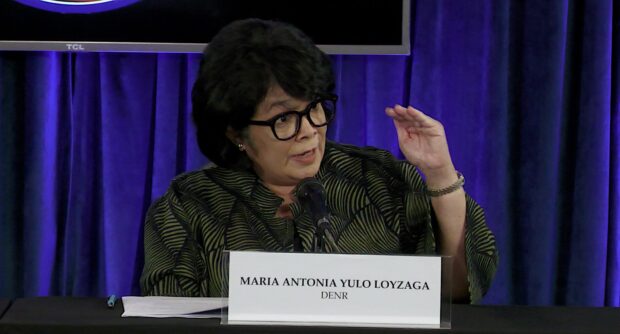PH to join NASA-led Asian air quality study

Environment Secretary Maria Antonia Yulo-Loyzaga during a press briefing in Malacañang in this file photo taken on August 2, 2023. INQUIRER.net file photo / Ryan Leagogo
The Philippines will participate in an international collaboration with the National Aeronautics and Space Administration (Nasa) to study and address air quality issues in the Asian region, Environment Secretary Maria Antonia Yulo Loyzaga announced on Sunday.
According to Loyzaga, Nasa will conduct scientific research flights over Metro Manila and its surrounding regions, with Filipino engineers and air quality specialists from the Environmental Management Bureau joining the Nasa scientists on board.
Loyzaga did not mention when the flights will be held, but the US space agency said in its website that the multinational field study will be conducted in early 2024.
READ: DENR experts boarding NASA flights to study Metro Manila’s air pollution
The research flights are part of the Airborne and Satellite Investigation of Asian Air Quality (Asia-AQ), a partnership that involves experts from Nasa in the United States, the Philippines’ Department of Environment and Natural Resources (DENR), South Korea’s National Institute of Environmental Research, Universiti Kebangsaan Malaysia and Thailand’s Geo-Informatics and Space Technology Development Agency.
Article continues after this advertisementThe Asia-AQ project aims to use advanced satellite technology, ground-based observations, and airborne missions to gain a better understanding of the air quality problems in Metro Manila and 12 other cities in Asia.
Article continues after this advertisementThe other candidate cities are Seoul, Tokyo, Taiwan, Hanoi and Ho Chi Minh City in Vietnam, Bangkok, Kuala Lumpur, Singapore, Dhaka, and Kolkata and Delhi in India.
To clear the air
Loyzaga said the collaboration with Nasa and other respected partners will lead to significant advances in the understanding of air pollution and the ability to tackle this pressing issue. “The data gathered from the research flights will be used in our programs to mitigate air quality issues that affect public health and address climate change,” she said.
She added that the collaboration will also help improve air quality models, provide accurate forecasts and develop effective policies to ensure better air quality in the future.
In the Philippines, the Asia-AQ project also involves the Philippine Space Agency, Manila Observatory, Ateneo de Manila University and the University of the Philippines.
“These organizations are joining hands to understand and tackle air pollution challenges in the region,” the DENR said.
Loyzaga said the Philippine government is committed to supporting the project and ensuring its success.
For 2023, the air quality in the Philippines was slightly worse than in 2022, according to the World Air Quality Report by IQAir. The average PM2.5 concentration in the country was 14.9 micrograms per cubic meter, which is three times higher than the World Health Organization’s safe limit of 5 micrograms per cubic meter. The Philippines ranked 69th out of 131 countries in terms of air pollution. INQ